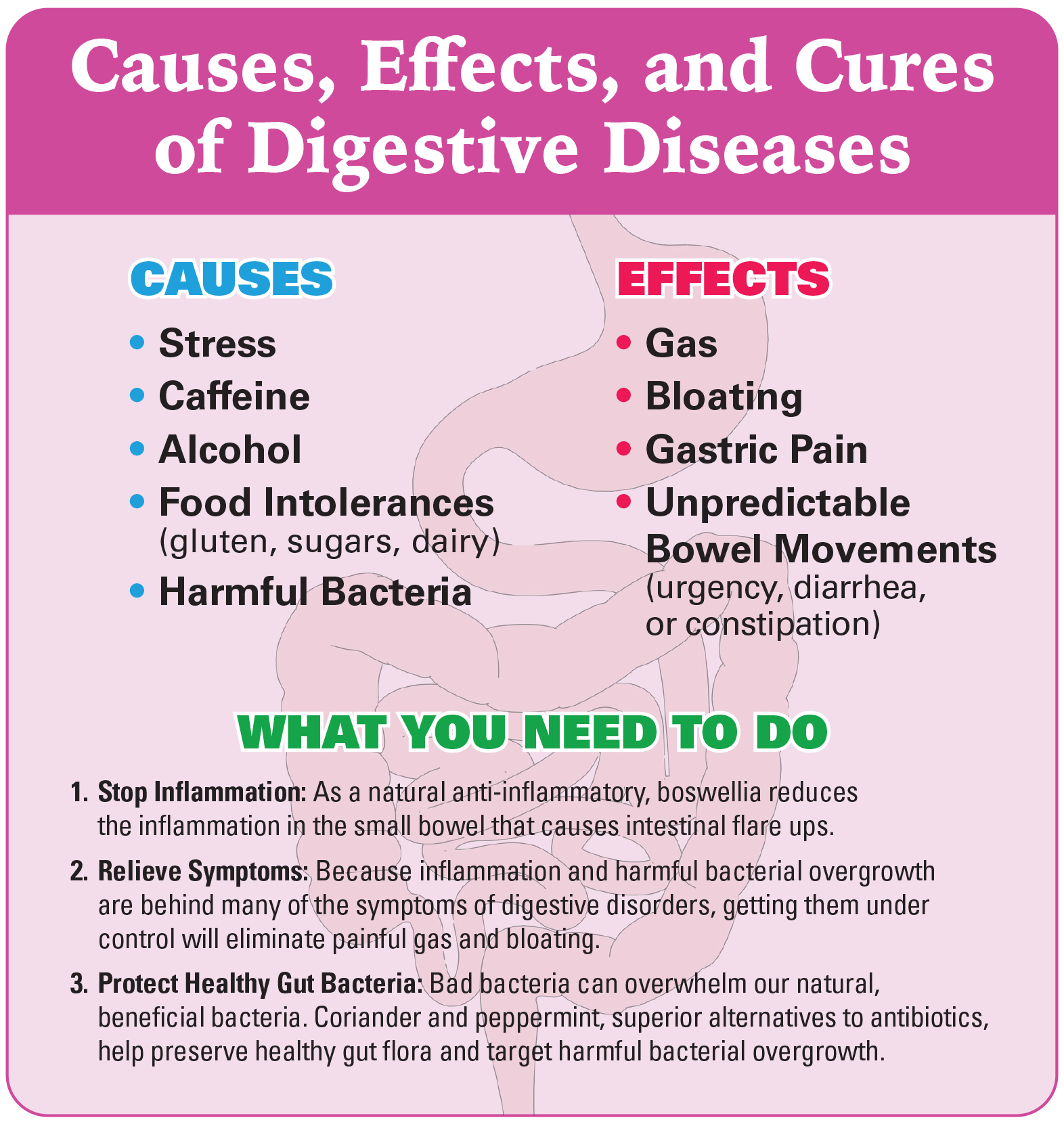Fortunately, there are strong botanical ingredients that stop the painful inflammation and digestive unpredictability that marks these conditions, and they do so without side effects. They are the focus of this article.

Inflammation and Digestion
Microscopic inflammation through the small bowel and colon may be one of the physical causes—and certainly one of the effects—of IBS. The already inflamed tissue causes the body to release inflammatory mediators that change the way the digestive system reacts to what would otherwise be normal operating procedure. In other words, inflammation in the gut sends a signal to the brain telling it that something is wrong. The digestive system reacts (or overreacts) by shifting into high gear, in the case of diarrhea—or slowing dramatically, in the case of constipation.
IBS is one of the most commonly diagnosed digestive disorders. Its symptoms range from cramping, bloating, and general digestive discomfort to diarrhea and alternating constipation. Flare-ups are unpredictable, so travel plans—and sometimes daily life—can be difficult at best. In the worst cases, individuals need to know at all times where the nearest restroom is located.
Aside from IBS, there are other digestive conditions that affect millions of people. Crohn’s disease, another inflammatory gastrointestinal condition, can cause fever, pain, bloody diarrhea, and loss of appetite.
Ulcerative colitis is inflammation of the colon that destroys patches of mucosal lining. Aside from pain, symptoms also include bloody diarrhea and stools that contain mucus or pus.
These conditions hinder the ability of the digestive system to deliver and absorb nutrients, possibly causing malnutrition, anemia, and unhealthy weight loss. So far, drugs and surgery have been the standard treatment, particularly for colitis. Unfortunately, this approach brings with it many major side effects. The better solution, and the one I recommend, is to use strong botanicals that get to the heart of the problem.
Boswellia—Stopping Inflammation is Key
Boswellia is a traditional medicine in use for thousands of years. New research finds that compounds from boswellia called boswellic acids can treat many conditions, including asthma, arthritis, intestinal/bowel disease, ulcers, bronchitis, and skin disorders.
Boswellia is a potent anti-inflammatory, but what makes it unique and so valuable is the way it fights inflammation. All inflammation is not the same. Prescription and over-the-counter medications typically act on the COX inflammation pathway, but they also damage the intestinal tract. Boswellia is better because it targets the 5-LOX inflammation pathway—which is specifically associated with gastrointestinal diseases and intestinal inflammation—without harmful effects that could ultimately make the problem worse.
The most active of the boswellic acid compounds responsible for boswellia’s effects is known as AKBA (Acetyl-11-keto-B-boswellic acids). To make sure you get the best, look for boswellia standardized to at least 10% naturally occurring AKBA.
In a German study, participants with Crohn’s disease were treated with either boswellia or the drug mesalazine (a drug commonly used to treat Crohn’s, ulcerative colitis, and IBS). Boswellia performed as well as the drug, but without the dangerous side effects.
In a clinical study of individuals with colitis, patients were given boswellia extract or the prescription drug sulfasalazine. Of the 20 patients treated with boswellia, 18 showed an improvement in one or more of the diagnostic parameters, including stool properties and mineral excretion, and 14 of the 20 saw a remission of symptoms across the board. The authors concluded that boswellia could be an effective treatment because of this—and noted its lack of side effects.
Other Herbal Ingredients
In addition to boswellia, there are other safe and effective herbal medicines that keep the intestines free of inflammation, and digestion running smoothly.
Coriander
Coriander provides protection from intestinal pathogens (including E. coli) and ends bacterial overgrowth that leads to IBS symptoms. Coriander, peppermint, and other botanicals have an advantage over conventional antibiotics in stopping bacteria. Because plants contain a variety of beneficial compounds, with minor variations from plant to plant (a plant is never exactly the same), bacteria have a harder time developing resistance to them versus a single-compound, prescription antibiotic.
Fennel
An Indian review mentions that fennel, among other traditionally-recommended botanicals, has a high flavonoid content that protects against peptic ulcer (which includes gastric and duodenal ulcers), and keeps the mucosal lining of the stomach and small intestines safe from damage. Fennel may also stop oxidative stress brought about by inflammation. This same review reported that flavonoids in general have antispasmodic and antidiarrheal effects, too.
A Brazilian clinical trial found that as part of a complex of herbs, fennel helped prevent constipation, so it appears to have a normalizing influence on digestion.
Caraway
In studies, caraway is often blended with peppermint. Like peppermint, caraway can help relax the smooth muscle cells in the intestines, and relieve bloating, gas, or other symptoms of dyspepsia. In fact, it appears to inhibit the digestive system’s initial reaction to gastric irritants, so it is perfect for anyone with chronic conditions who occasionally (or accidentally) eat triggering foods.
Caraway oil (in conjunction with peppermint oil) also stimulates gallbladder activity, and normalizes digestive transit time, helping the foods we eat travel through the intestines more predictably.
Peppermint
Not only is peppermint long recognized for everyday gastric relief (think about after dinner mints, or the tradition of mint served with lamb for easier post-meal digestion) but it is also being researched as an herbal bacteria fighter. It is able to destroy harmful bacteria without harming the beneficial bacteria we need for normal digestive function.
Make Life Predictable Again
I also believe that changing your diet is critical to treating digestive diseases. Avoid wheat (and other grains), refined sugar, and dairy products. Any one of these, or a combination of them, can make IBS and other digestive disruptions more likely. To learn more, I recommend reading Breaking the Vicious Cycle, by Elaine Gottschall and Wheat Belly, by William Davis, M.D.
Although changing your diet is very difficult, making that commitment, along with using a boswellia and herbal extract combination as I’ve discussed here, can get your digestion back on track again.
For IBS, Crohn’s, or other gastric concerns (gas, bloating, cramping, etc.), I recommend taking boswellia resin extract standardized for AKBA, along with coriander, fennel, caraway, and peppermint oils daily.
